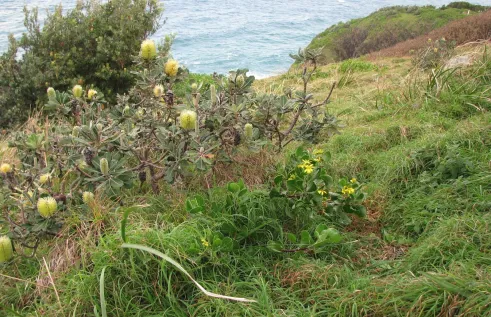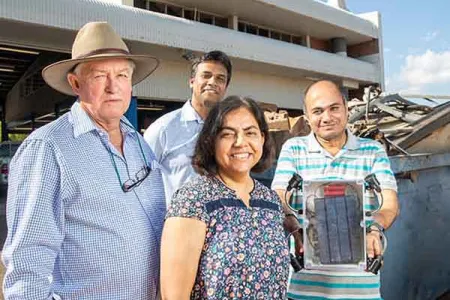News article
Smart Skips project wins national award
The Smart Skips project developed by Charles Darwin University has been hailed for excellence at the Regional Development Conference where it has won the Innovation Award.
Project leader Dr Deepika Mathur, a Research Fellow with CDU’s Northern Institute, said the accolade was richly rewarding for her colleagues in the university’s higher education and VET sectors, as well as associates in industry and local government who had worked together to develop a solution for a real-world issue.
Dr Mathur said a smart skip was a commercial waste bin fitted with electronic sensors that transmit data about the volume and weight of the contents to the building supervisor and the skip operator.
“The aim of the project is to improve efficiencies within the construction industry.”
“Studies show that on-site sorting is one of the most efficient ways of sorting construction and demolition waste. If waste is sent to a management facility already sorted there is a higher chance the material can be reused or recycled.”
Dr Mathur said construction waste was the largest single source of waste to landfill, making up 30 per cent nationally.
“As a pilot, the first set of smart skips was installed at the Albrecht Oval construction site (in Alice Springs) in July, with one being allocated for concrete and bricks, another for steel and the other two for mixed waste.
“Basically, this project has been working very well. Internet connectivity allows us to keep an eye on fill levels, which informs future fill rates and optimal collection times. Since installation, we have carried out a few routine check-ups, replaced some batteries, and identified some design improvements.
“It is still a small-scale and local-level initiative, but we are optimistic that it could develop into something with national or even international applications.”
Dr Mathur said the project demonstrated how small-scale and local-level innovation could produce something with national or international ramifications.
“I am most grateful to my colleagues Rolf Gerritsen, Bharani Shanmugam, Sami Azam, Danny Sneddon and Rohan Badenhop for bringing their expertise to the project and working as a team,” she said.
The project was funded by the Australian Government's Smart Cities and Suburbs Program to improve the liveability, productivity and sustainability of cities and towns across Australia.
Related Articles

Nanoplastics hindering cognitive abilities of fish, international research shows
Nanoplastic exposure can impair the cognitive abilities of fish and could lead to significant impacts on marine species’ ability to survive, according to a new international study.
Read more about Nanoplastics hindering cognitive abilities of fish, international research shows
New project to grow Indigenous aquaculture on one of Australia’s largest islands
An Australian island’s efforts to improve food security and transition into a blue economy will be bolstered by a new project to propagate a nutritious and increasingly popular fish.
Read more about New project to grow Indigenous aquaculture on one of Australia’s largest islands
Potential for satellites and AI to help tackle critical invasive species problem
Satellite imagery and artificial intelligence can detect with high accuracy two invasive weed species in Australia, posing a new opportunity for defense against these pervasive plants.
Read more about Potential for satellites and AI to help tackle critical invasive species problem
